21 September 2023
Harbour Hockey – Home of The National Hockey Centre
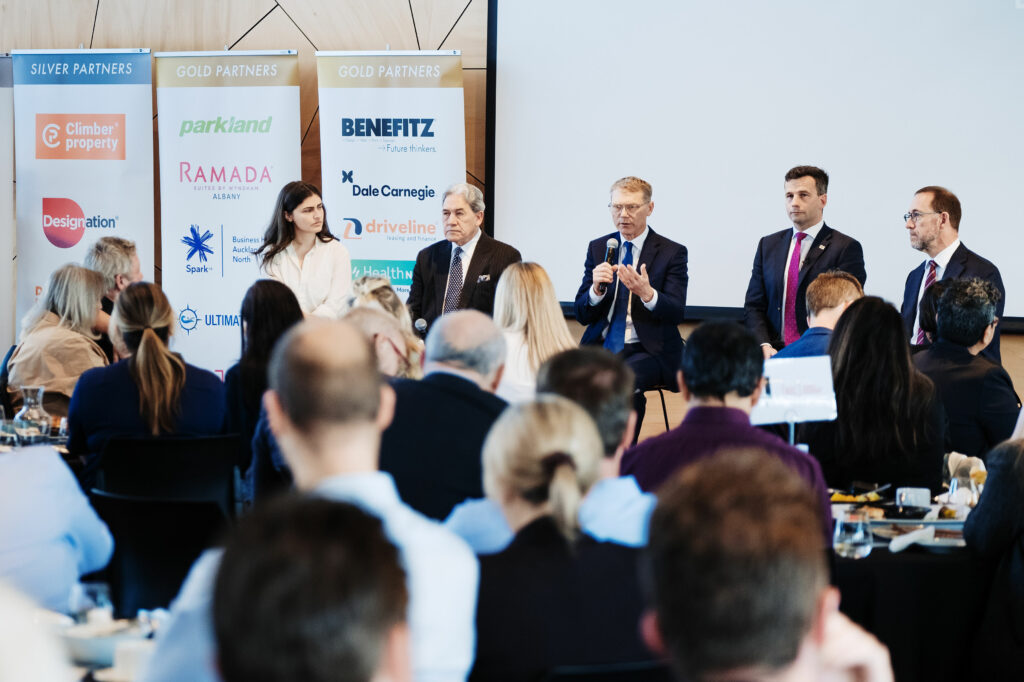
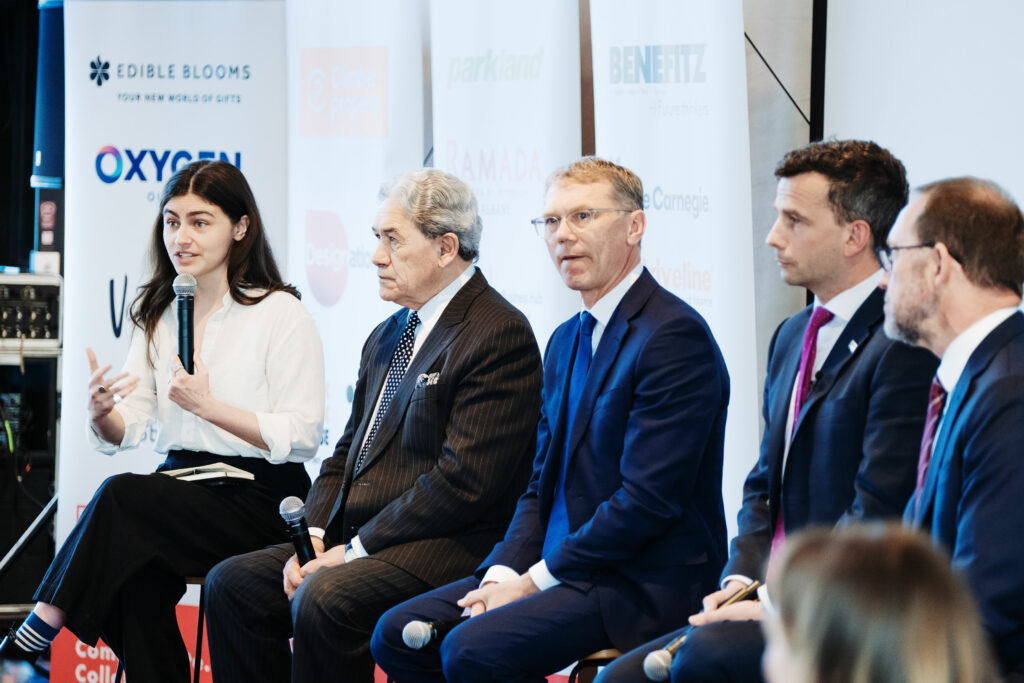
Participants (listed in party alphabetical order):
- ACT New Zealand: Hon. David Seymour
- Green Party: Chlöe Swarbrick
- New Zealand First: The Rt. Hon. Winston Peters
- New Zealand Labour Party: Hon. Andrew Little
- New Zealand National Party: Hon. Paul Goldsmith
MC and Moderator: Tim Beveridge, NewstalkZB
It’s been hailed as New Zealand’s most important election for decades, so it was no surprise that this event was sold out well ahead of time.
Business North Harbour (BNH) General Manager Kevin O’Leary welcomed the 160+ guests, setting the scene in what has been an extremely challenging year. Events such as this, he said, were crucial for enabling informed and constructive dialogue between the local business community and political leaders.
“Many [BNH] members are still doing it tough; indeed, some are scrambling to survive. So, it’s important that our guest speakers ensure that the light flickering dimly at the end of a long tunnel for some isn’t switched off completely but is, in fact, destined to burn brightly as a result of their economic policies.
“I look forward to hearing how each party plans to shape our short and long-term economic future.”
There was an acknowledgement of Mental Health Awareness Week, with a short presentation from Darryl Bishop, group chief executive of Ember Korowai Takitini (one of BNH’s Platinum Partners).
MC Tim Beveridge (“cheaper than Mike Hosking!”) explained that the representatives from each political party would have 6-8 minutes to lay out their priorities. The order of speaking had been randomly drawn prior to the start of the event. Here are the key points from each speaker’s presentation.
Chlöe Swarbrick
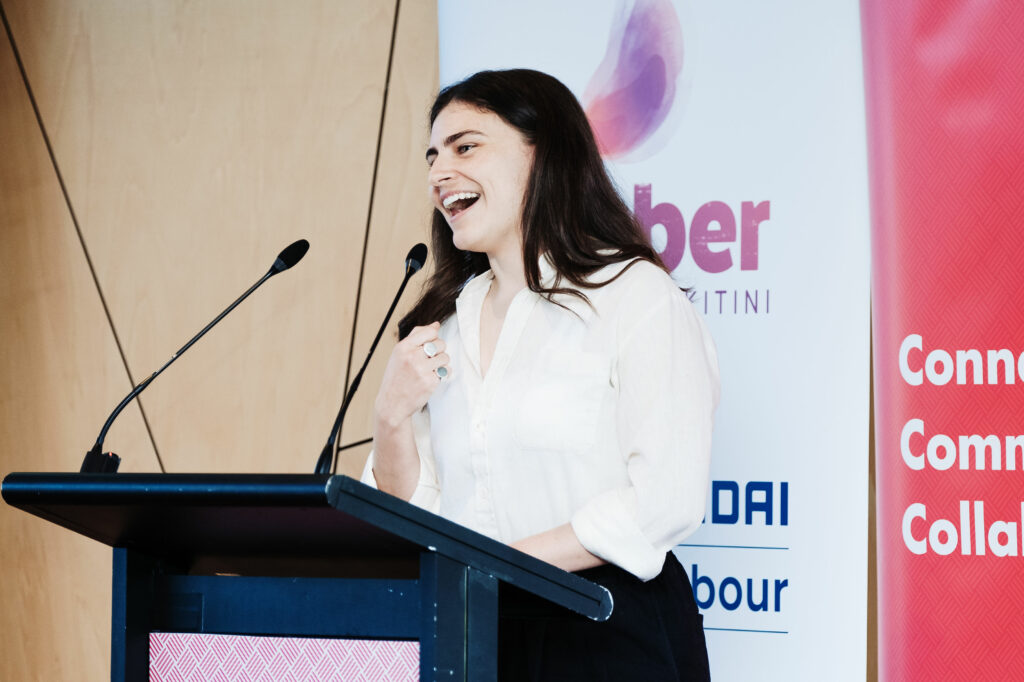
Aotearoa’s youngest MP also acknowledged Mental Health Awareness Week and how the environment in which we live can affect our brains. “I guess that’s the thing we’re all here to talk about today – those opportunities, threats, and vulnerabilities but also where we can all go working together.”
What does it mean when we discuss “the economy”? For Greens, it’s about the rules and regulations that try to incentivise or disincentivise certain types of outcomes. “For the Greens, that’s for the betterment and wellbeing of people and the planet”.
If New Zealand is to move forward, it’ll be important to look at the set-up of the economy “and who we want that economy to serve”. Part of this is about the capital flow. A disproportionate capital flow into property speculation “comes at the expense of innovation and productivity”.
There should also be a focus on “localism and how we can ensure our local industries thrive”. “We also need to ensure that the government is more orientated on procurement of local services and goods”.
Ms Swarbrick cited the example of the country’s last industrial wool scrubber. Without requisite investment, wool marked as “Made in New Zealand” will have to go offshore to be finished and then brought back into this country. “That’s not only a massive loss for the talent and opportunities here, but it also imposes massive issues with regard to carbon leaching and the greater carbon emissions profile of those products.”
She concluded by urging guests to go away and look at each of the parties’ respective policies in depth so that they can see costings and how promised outcomes will be achieved. “The power really is in your hands this election.”
David Seymour
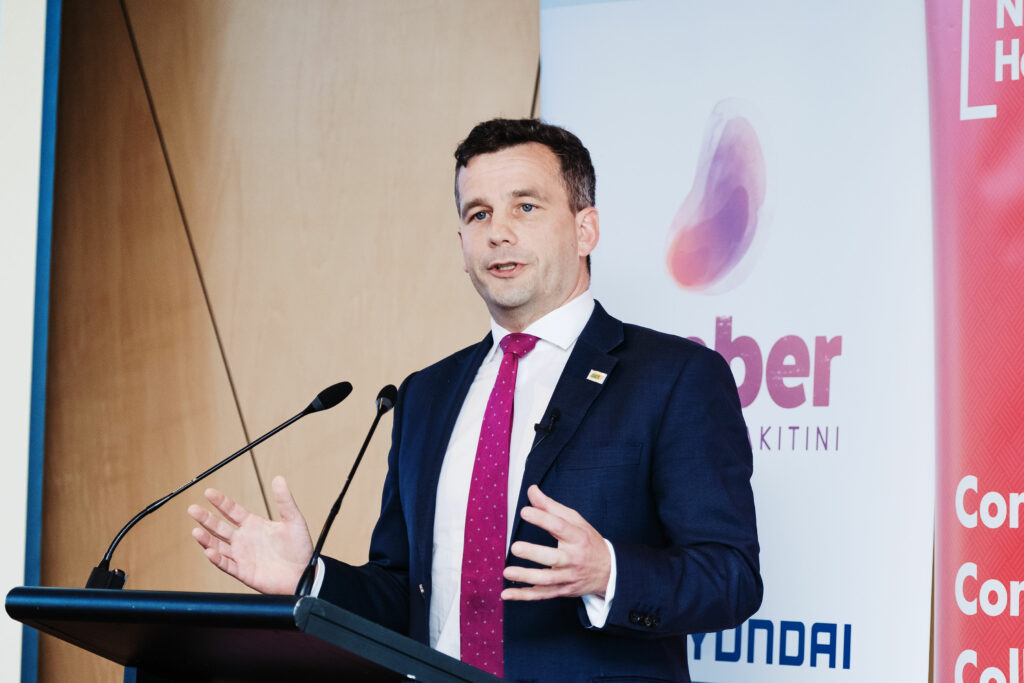
“Give your party vote to ACT. We need real change in this country.”
Mr Seymour stressed the need to understand economic policy – where we need to go and what it will take to get there. People on six-figure salaries are struggling to pay their mortgages; consumers are walking, but they’re walking with fewer shopping bags. “This is a direct result of a government that has ramped up the spending to an extraordinary extent – 30 per cent more per person”.
Moreover, he said, “It is harder to get business done in the current regulatory environment. All of this is making us poorer than we otherwise need to be.”
ACT proposes a “brave and comprehensive programme” to change things that aren’t working, and believes that “business is a force for good” to be celebrated and supported.
Mr Seymour would advocate for a “tough series of budgets” requiring government departments to do more with less. He feels that the Ministry for Social Development (MSD) should be judged on how well it gets people off a benefit, into work, and how long they stay there. If MSD performs well, the CEO should get paid more. “Might be the best money we ever spend as a country.”
Cutting red tape for business is a priority. “If I had to summarise the problem I hear most often [it’s that] we spend more time in compliance activity than we get to spend on actual production.” NZ needs to get back some of that “number eight wire /Earnest Rutherford” attitude so it can be productive “rather than over-regulated”.
Infrastructure is crucial. ACT would implement its 30-year plan “and be prepared to use tolls, targeted rates, public-private partnerships” and other potential means to expedite projects. “We don’t care how, as long as it gets built, it’s efficient, and it makes people’s lives better”.
Paul Goldsmith
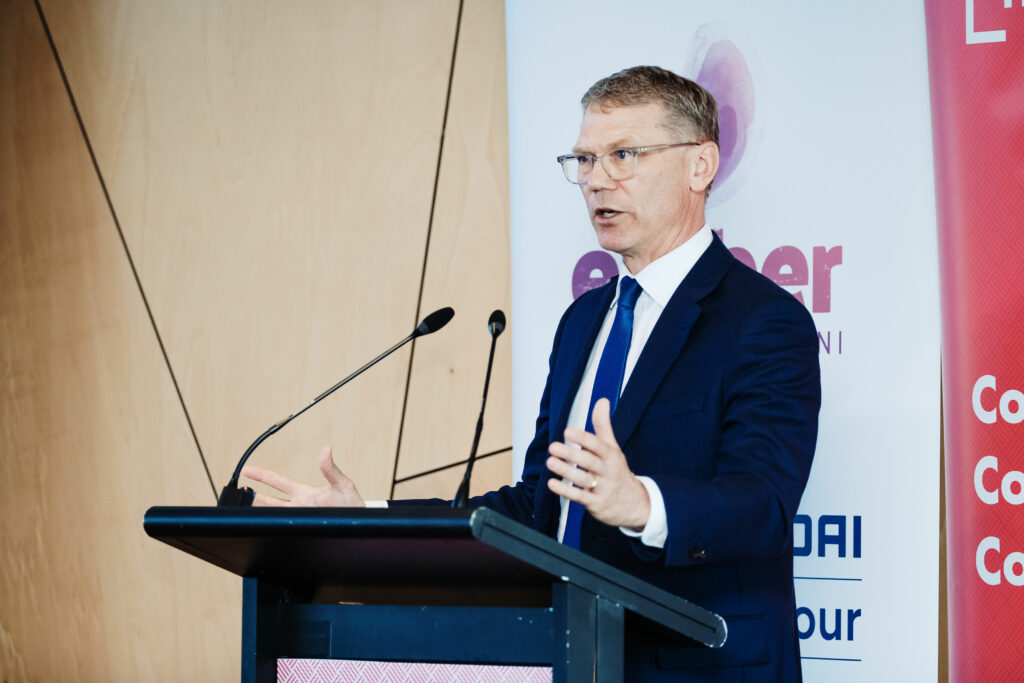
“Businesses large and small are a force for good in our economy.” However, NZ is heading in the wrong direction, said Mr Goldsmith, and that, “first and foremost”, we have to get on with “fixing our economy and restoring some growth”.
National has a “clear inflation-fighting plan”, which begins with getting the Reserve Bank focused on inflation. Then, there needs to be discipline around spending and regulation. “One of the core philosophies of the National Party is a regulatory restraint.” “Every day, somebody brings along a bright idea for a problem that can be solved with a new piece of legislation.” Although these things may make sense individually, “collectively they just add pressure and cost to business”.
Turning his attention to housing and rent increases, Mr Goldsmith observed,” If you make it too expensive, unprofitable, or complex, he reasons, people pull out – creating a shortage, driving up prices, increasing waiting times for public houses, and “an explosion” in the number of people on emergency housing.
“Then you’ve got to give some tax relief.” Inflation has pushed people into higher tax brackets. Mr Goldsmith said that a “disciplined government reduces those thresholds and returns money back to the pockets of New Zealand – which is what we propose to do with our tax plan”.
Growing the economy is about restoring productivity. It’s about investment, which only happens “if people feel confident”. So, there has to be some predictability.
He discussed changes to the RMA (Resource Management Act) and the te reo-based concepts within its natural environment sections. “Nobody understands what they mean.” If lawyers can’t figure it out, investors will not want to take a chance and will spend their money elsewhere. Furthermore, investment requires decent-quality infrastructure. National is proposing a four-lane highway connecting Whangarei, Tauranga and Hamilton. “Basic infrastructure that would connect half the population of New Zealand … and let this whole region explode and boom like it should”.
Finally, he said that education should be based on a “global curriculum” in what the rest of the world calls science and commerce, not unique versions created in New Zealand.
Winston Peters
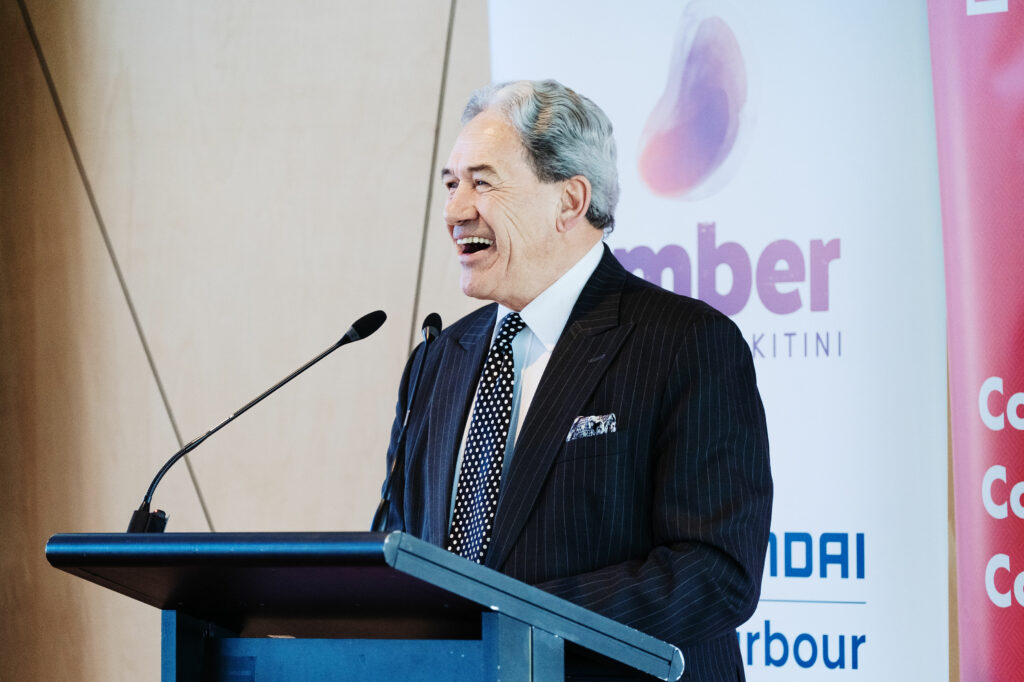
Mr Peters’ primary focus was on fiscal matters. He was in a typically rambunctious mood. “The appalling mismanagement of Labour over the last three years since the adults in New Zealand First left the room was laid bare in the PREFU on the 12th of September.”
He confirmed that New Zealand First is committed to making the first $14,000 tax-free, but this cannot happen until April 2026 at the earliest. “No party can look you in the eye seriously and say their tax cuts are affordable,” he declared, arguing that no nation can survive if it has less money coming in the front door than is being spent out the side door. “That’s voodoo economics.”
He had some strong views about other parties’ economic policies: one claims a $38 billion reduction in government but no detail, another has 10c off the cost of turnip, and another has one thousand ways to spend money but not one way to earn it.
Mr Peters calculates that the Labour government’s spending has increased by 22,000 every minute of every day since “New Zealand First’s handbrake and common sense and restraint left the cabinet.”
He said there is virtually nothing to show for this spending and that fiscal irresponsibility has resulted in “rampant inflation, the loss of our best to Australia and a worsening cost of living crisis.”
In a bold pledge, demonstrating Mr Peters’ confidence at being returned to Parliament, he said, “New Zealand first promises to work like to work with like-minded thinkers to introduce our mini-budget before Christmas, straight after the election. We can’t wait; we can’t keep spending like this. We’ll end up a South Seas Venezuela.”
His party’s fiscal strategy would be to re-establish a spending cap for 2024/25 and to focus meanwhile on the basic essential services, “which is all we can now afford”.
Exports will be central to growing the economy – “adding value to the max before any other economy gets it”.
He concluded, “We know you’ve got a propensity to rush off and vote for right-wing parties … but advise you: add some insurance. Party vote New Zealand First.”
Andrew Little
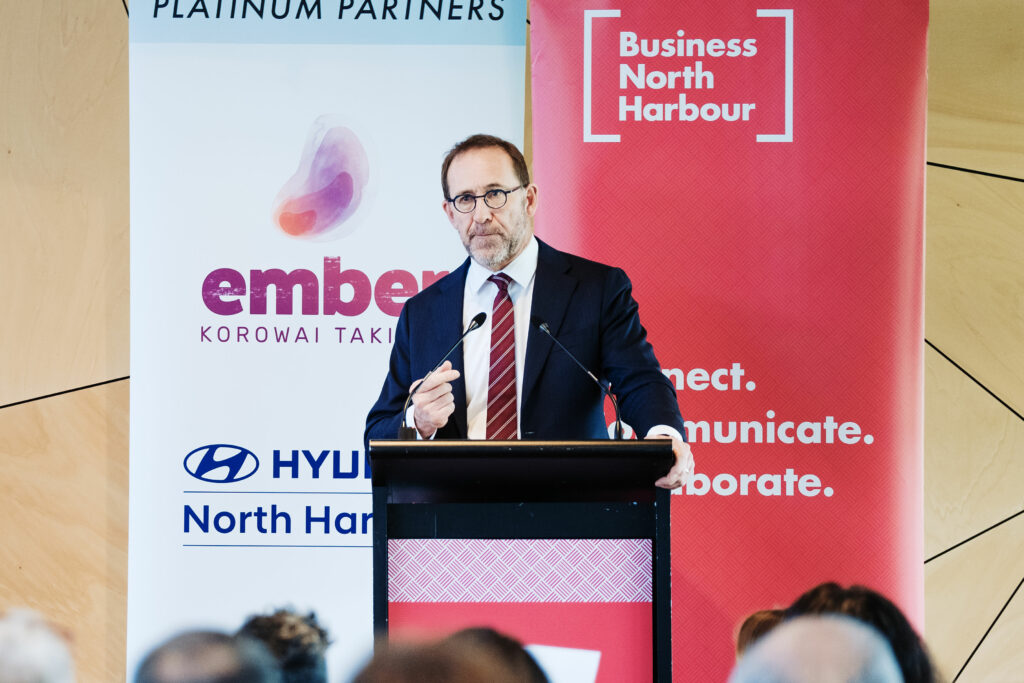
Mr Little recapped some of the Labour government’s priorities and achievements over its six years.
- Chronic housing shortage and chronic homelessness
Thirteen thousand public houses have been added, with another 4,500 currently under construction. - Chronic under-investment in infrastructure
“My experience as our health minister really was an eye opener … At Middlemore Hospital and Whangarei Hospital, we had sh*t running down walls because those buildings had not been looked after. There were parts of those hospitals that could not be occupied. We now have a seven-and-a-half billion-dollar building programme across our hospital network.” - Chronic child poverty
Seventy-seven thousand children have been lifted from the worst poverty, and 100 million school lunches have been delivered. - Benefit rates have been lifted, and the training incentive allowance reinstated.
- The minimum wage has been increased.
- Planning and environmental laws
“The RMA was a handbrake on innovation and development in this country. It stifled both and didn’t protect the environment.” It was repealed, and now we have “legislation that will enable faster and better-quality development”. - “Climate change and the consequences of it are the single biggest predictable risk to our economy, to your businesses and the towns and cities of New Zealand.” Programmes to reduce carbon emissions and emphasise renewable energy have been introduced, along with wind power, solar and hydro. There’s also been a focus on EVs and public transport, including light rail.
- Trade agreements have been diversified, going broader than China.
- Public sector workers
A net 1,800 additional police officers have been added. 5,000+ doctors, nurses, and specialists have been funded. Eleven hundred frontline people have been added to the mental health workforce.
“We now have an economy where the inflation rate is falling … the economy is growing. It never was a recession, and the prospects are looking very good.” Mr Little evidenced this by stating that New Zealand still has one of the lowest levels of unemployment and that net debt remains one of the lowest in the Western world.
Labour’s commitment would remain focused on housing, infrastructure, transport, building, resilience, health, helping business adapt to climate change, addressing the cost of living, community safety, and business development.
“But above all, what we promise, we know we can pay for.”
There followed a Q+A, with questions that had been submitted in advance and from the audience. (Please note: these are summarised responses, not verbatim.)
Question: What would your top message be when it comes to one single portfolio? What would you emphasise?
Andrew Little (AL): Infrastructure, because it’s an enabler for communities and business, and ties in with climate change, with huge prospects for public and private investment.
David Seymour (DS): Lessening the burden of red tape. So, ultimately, there is more time being productive and less time being compliant.
Paul Goldsmith (PG): The finance role. Making sure that the billions of dollars a government spends are spent in a disciplined way focused on the desired outcomes.
Winston Peters (WP): The most critical thing is that New Zealand faces a threat to its democracy. Duality and co-government have taken away the one person, one vote. Every vote must have equal value. There is duality in our health system and all over the place.
Chlöe Swarbrick (CS): Concerns about how much policy is made with a dearth of evidence behind it. This leads to a lack of evidence-based policy and debates that are largely misinformed.
Question: Are our immigration settings right, or what needs to change?
AL: Yes, but the challenge is getting the right people at the right skill level. Labour has made it easier for employers to recruit offshore and simplified the points system. Checking accredited employers is potentially where there’s a struggle.
DS: No, the rules need to be simplified and streamlined. There should be a commitment that the country is driven by migration. Businesses need to get the same mix of skills as their offshore competitors. A visa shouldn’t tie someone to one employer – that’s a recipe for abuse.
PG: David covered many of the points. Consistency and a focus on the real skills NZ needs are good. The only way to improve wages long-term is to have a more productive economy.
WP: The OECD says that NZ has a totally unfocused immigration policy. It’s in crisis. We need more doctors, nurses, and specialists. Long-term, the focus must be on bringing in the people we need, not people who need us.
CS: No, the immigration system is not working. We need a simplified system that works better and is human-centric. Agreement: a visa should not tie someone to a single employer. Successive governments have propped up GDP figures by virtue of immigration but haven’t made the requisite investment in infrastructure.
Question: Specifically for Paul Goldsmith, what is the timeline to remove the interest deductibility phase-out on residential investments?
PG: As quickly as we can. Not in the first year, but phased in over three years. We’ll keep it at 50 per cent and then ramp it back up to 100 per cent over three years.
Tim Beveridge invited DS to comment.
DS: Our alternative budget restores 100% mortgage interest deductibility on residential property from 1 April 2024.
Question: Chloe, The Greens support the environment, but you’ve also got your economic policy. I have a lot of people on talkback who are frustrated because they think that the Greens should be an environmental party, able to work with any party and be in government all the time. What’s your answer to that?
CS: We work across the aisle constantly, including with the former National government on the Warm-Up Kiwi Home Scheme. I worked closely with David [Seymour] on the end-of-life choice stuff, the finance and expenditure committee with Nicola Willis, and the unit titles amendment legislation. So, we do frequently work across the aisle.
All green parties all across the world have the same four core interconnected principles:
- Ecological wisdom
- Social responsibility
- Devolving decision-making to the level where it actually affects people
- Non-violence – of course, we’re hippies; we don’t like going to war. But a little deeper than that, it’s about building systems that include as many different perspectives as possible so that no-one is neglected or left behind.
Question: Would you consider making private health insurance tax deductible?
AL: No
DS: Tempting, but then you start putting holes in the tax systems, and once you start doing that, it’s very hard to say no.
PG: No, we don’t support that.
WP: The health system everywhere is in crisis. We would look at this idea very, very seriously.
CS: No, we need to fix the public health system.
Question: Andrew Little, your party recently re-released a women’s manifesto, and one of the promises was to raise the breast cancer screening age from 69 to 74. That was also in your coalition document with New Zealand first six years ago. How does that affect the credibility of such a promise when it was made six years ago and hasn’t happened yet?
AL: A lot of things were disrupted by Covid. We’re now in a position to do it, and we will.
Question: What first steps would you take to stimulate growth and create jobs in New Zealand?
WP: The mini-budget before Christmas, rapidly grow our exports, and make sure we add value to things.
DS: First, do no harm. Address the regulatory impact that the government has on people trying to do business. Get infrastructure built faster with a wider range of funding options.
PG: Clear priorities for each public service. For example, my first message to the Justice sector will be that we’re dropping the current priority to reduce the prison population by 30 per cent, irrespective of what’s going on in the community, and replace that with an absolute focus on reducing the number of victims of crime.
CS: It’s infrastructure and productivity, reiterating the role of local government. In Auckland alone, we spend over a billion dollars per annum in congestion in terms of productivity and costs. So again, it’s about having practical local-level interventions that can work if we give local governments the ability to get on with it.
Question: “I want to know each party’s specific actions to mitigate climate change.”
PG: Half of our emissions are from methane. We’re going to change regulations around gene editing so that scientists can provide better solutions. For example, there are rye grasses that reduce the amount of methane livestock produce, but we can’t use them here.
CS: There are two aspects: mitigation and adaptation. This has to be a ‘whole of economy’ approach. Regarding agriculture, we have to consider the potential impact on our clean, green image. In our cities, our highest emissions are from transport. We need to look at how we can better use the assets we already have, which will probably be reallocating road space. I know it’s not necessarily going to be popular, but how can we look at jurisdictions overseas where these evidence-based policies have been introduced to massive success and say, ‘We are different. We’re going to do things in our own way and continue to cram more cars into finite space.’ This approach is detrimental to people’s wellbeing and the ability for local hospitality and retail to thrive.
WP: Carbon dioxide is 0.04 per cent of the earth’s atmosphere, and humanity’s contribution is 3 per cent of that. Countries like China, India, Russia, and the United States are not taking action at all. ‘We can get there with science, we can get there with caution, but the last thing we’re going do is panic this population and send our economy broke because some people haven’t got their facts right.’
AL: We want to be 100 per cent renewable by 2030. The EV programme to increase the uptake of electric vehicles has been very successful. Transport planning has had an emphasis on public transport, including light rail. Also, the Healthy Homes initiative, requiring all homes to meet certain energy efficiency standards, and the government’s carbon reduction programme. Defence will own the last coal-fired boiler at the Burnham Military camp, due for replacement in 2028. I’m doing my best to try and accelerate that.
DS: Consumers that New Zealand exports to and the governments who gatekeep those markets expect New Zealand to have climate action and policy. We can’t afford to become a pariah; a small trading nation must stay in sync. That said, we don’t want to put the most efficient farmers in the world out of business. So, we should be looking for a simple, efficient, durable solution. And that is to tie New Zealand’s emission totals in line with what our top five trading partners actually emit – not what they say.
The Q+A concluded.
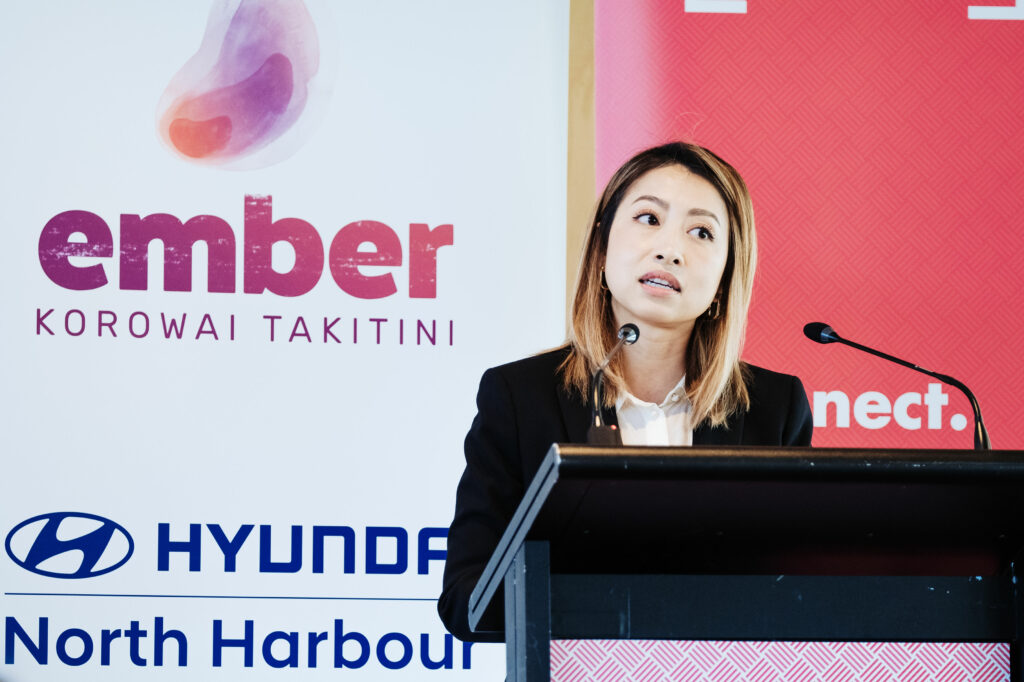
Tim Beveridge invited Ketien Chuor, chair of BNH’s board of directors, to say a few words. She thanked the speakers for their time and dedication, and then appealed to the audience. “I want to emphasise the importance of your participation. The 2023 election is not just an event. It is an opportunity for us collectively to chart the course of our future. And therefore, I urge each and every one of you to exercise your right to vote in the upcoming election. Your vote is your voice. It matters to us, and it matters to our political leaders. It is through this process that we can ensure our individual and collective values and aspirations are represented at the highest levels of government.“
Finally, Ketien thanked the BNH for their hard work organising this event, a sentiment endorsed by a hearty round of applause.
BusinessElectionPoliticsPre-election



